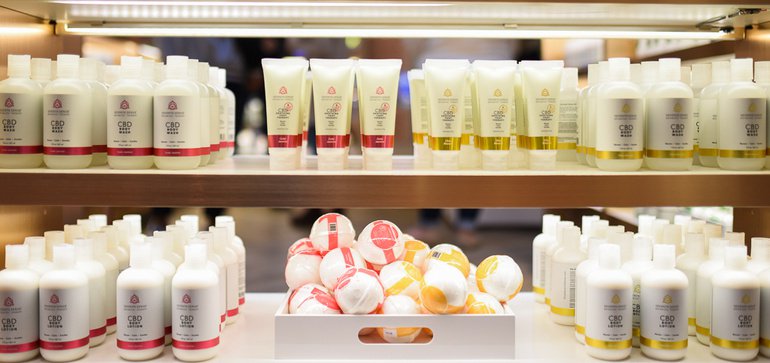Dive Brief:
- Green Growth Brands, a cannabis goods maker and retailer that is publicly traded in Canada, on Wednesday announced the opening of its first Seventh Sense CBD Shop at the Fayette Mall in Lexington, Kentucky, (now owned by CBL & Associates Properties), the first location of hundreds planned nationwide, according to a press release emailed to Retail Dive.
- On Monday, GGB also announced that it will run 108 shops in U.S. malls owned and operated by the Simon Property Group. Through that move, GGB will expand its chain of CBD-infused personal care shops under its Seventh Sense brand and other GGB brands, according to a company press release. The first is set to open in March at Castleton Square Mall in Indianapolis, with others opening throughout the year.
- The moves were announced the same week that upscale department store Barneys New York said in March it will launch “The High End,” a luxury cannabis lifestyle shop, in its Beverly Hills flagship. The GGD operation appears to be catering to a broader clientele.
Dive Insight:
The cannabis laws garnering headlines in recent years have centered around many states’ legalization for medicinal (33 states) and even recreational use (10 states). That’s created a patchwork of legalities with varying regulations and limitations, and federal law has remained mostly inert.
That changed at the end of 2018 when the U.S. farm bill was signed into law, thereby removing the cannabis plant hemp’s designation as a Schedule I substance under the Controlled Substances Act, effectively decriminalizing it and the cannabidiol derived from it.
That’s poised to make it a big year for CBD products, bringing purveyors like GGB over the border from Canada (where, under some strict age, amount and other limits, cannabis has been legal nationwide since last fall) and leaving wellness and beauty manufacturers apparently free to add the substance to their formulas. While the company does do business selling cannabis with the psychoactive compound tetrahydrocannabinol (THC), the Simon mall shops will sell only products containing non-psychoactive CBD (cannabidiol), according to a GGB spokesperson.
It could be a good opportunity for malls, which have suffered declining traffic for years as their department store anchors have shrunk their footprints amid falling sales. GGB CEO Peter Horvath said in a statement that the company has had “an overwhelmingly positive response from the developers we are working with.” Simon Malls President John Rulli in his own statement said the GGB shops fulfill the developer’s desire to invite in “cutting-edge new concepts.”
“We are committed to adding new and dynamic retailers and uses to our shopping destinations, and the GGB shopping experience is exactly the type of innovation our customers want and expect from us,” Rulli also said. “We’re excited to work on the GGB launch, and look forward to a long and deepening relationship as we build this network together.”
That will be worth watching. However, while CBD doesn’t produce a high, that doesn’t make the substance free and clear. Legalization continues to progress in fits and starts in the U.S., and there remains confusion about what the farm bill’s adjustments actually allow. Hemp is now simply an agricultural product and not a controlled substance, but on the day the farm bill became law, the Food and Drug Administration promptly defended its authority to regulate products containing CBD and THC.
“Where we believe consumers are being put at risk, the FDA will warn consumers and take enforcement actions,” the agency warned in a lengthy Dec. 20 statement, adding later, “While products containing cannabis and cannabis-derived compounds remain subject to the FDA’s authorities and requirements, there are pathways available for those who seek to lawfully introduce these products into interstate commerce. The FDA will continue to take steps to make the pathways for the lawful marketing of these products more efficient.”
That leaves some uncertainty, but apparently not enough to stop personal care companies and retailers, which are gaining momentum in marketing CBD-infused products. Simon itself is gaining more than traditional rent from the deal: In exchange for consulting “services rendered” related to GGB’s shop expansion strategy, GGB issued to Simon Canada $2.23 million (CAN$2.92 million) in GGB common shares and 1,000,000 common share purchase warrants, according to the release.
Follow Daphne Howland on Twitter

